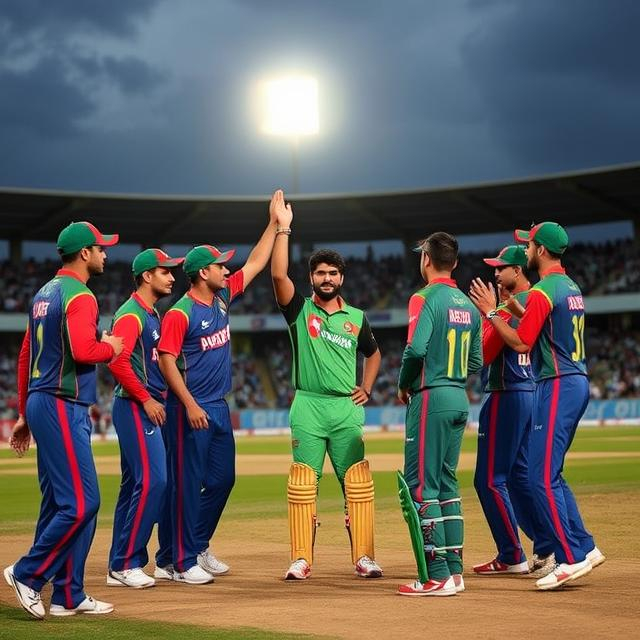Mosques Closed in Pakistan for Cricket Match: A Deep Dive into Religious Observance and National Passions

Mosques Closed in Pakistan for Cricket Match: A Deep Dive into Religious Observance and National Passions
Cricket fever gripped Pakistan, and with it came a fascinating interplay of religious observance and national fervor. This article delves into the recent news of mosques being closed for a major cricket match, exploring the complex cultural and societal factors that underpin this decision.
Click here to discover the untold story of Pakistan’s unique blend of faith and sports!
A Nation on the Brink of a Cricket Frenzy
Pakistan’s passion for cricket is legendary. Matches are often more than just sporting events; they are national spectacles, drawing millions into a shared experience of exhilaration and disappointment. The sheer volume of people who follow the game, from street vendors to seasoned analysts, underscores its profound impact on Pakistani society.
During high-profile matches, the nation practically comes to a standstill, with businesses closing, and daily routines often altered to accommodate the excitement. This is a powerful illustration of cricket’s significance in Pakistani culture and social fabric.
The Significance of Religious Observance in Pakistan
Islam is the dominant religion in Pakistan, and it plays a significant role in shaping the nation’s cultural identity and social norms. Religious practices and beliefs are deeply ingrained in the daily lives of many Pakistanis. It’s a testament to the multifaceted nature of Pakistani identity, where faith and national interests intertwine.
Understanding how religious observance is interwoven with daily life is critical to comprehend the decision to close mosques for the match. It goes far beyond simply fulfilling religious duties; it often reflects the community’s values and shared beliefs.
Balancing National Passions with Religious Obligations
The decision to close mosques for a significant cricket match isn’t a straightforward matter. It raises intricate questions about balancing national fervor and religious obligations. For many Pakistanis, prayer and religious activities hold paramount importance. The decision highlights the delicate equilibrium Pakistani citizens must navigate between their love for the national sport and their commitment to faith.
A Historical Perspective
Throughout Pakistan’s history, there have been many instances where national events, including sporting ones, have significantly influenced religious observances. This dynamic interplay between social and spiritual values has shaped the cultural narrative of Pakistan, showcasing the country’s resilience in harmonizing traditions.
Analyzing the Public Response
Public response to the mosque closures varied. Some lauded the move, emphasizing the national importance of the match and the significance of uniting the nation around a common cause. Others expressed concern regarding the potential impact on religious observance and the balance of religious practices with societal activities.
The Role of Religious Leaders
The role of religious leaders in guiding public opinion and interpretation of Islamic principles is noteworthy in such situations. Their statements on the matter often shape the community’s perception and action. This underscores the importance of religious figures in maintaining the balance between faith and national enthusiasm.
Understanding the Cultural Context
Pakistan’s unique blend of culture and faith makes the decision even more multifaceted. The interplay between the nation’s deep-rooted religious traditions and the modern, intensely passionate sports culture must be understood. This cultural fusion gives rise to fascinating dynamics that have a significant impact on daily life.
Implications and Future Considerations
The decision to close mosques for a cricket match has implications that extend beyond the immediate event. It raises crucial questions about the prioritization of social events versus religious practices. This situation prompts us to consider the evolving nature of societal and religious values in Pakistan and the strategies for a balance moving forward.
This discussion also provides insight into how different societies manage these tensions. Such scenarios, repeated across the world, highlight the need for community understanding and responsible guidance.
The Economic Impact
The economic reverberations of the match, in terms of the influx of people, the atmosphere, and increased commercial activity, are profound. Businesses across Pakistan reported boosted sales, and the overall fervor generated economic activity. Examining the financial impact provides an additional perspective on the depth of the sporting passion within Pakistani society.
Alternative Viewpoints
It’s essential to acknowledge and address alternative perspectives. Some might argue that the closure of mosques was unnecessary or excessive, causing inconvenience. These viewpoints contribute to the nuanced discussion surrounding the subject.
Conclusion
The closing of mosques for a cricket match in Pakistan highlights the complex interplay between religious observance, national pride, and popular culture. It underscores the importance of understanding the cultural and historical contexts that shape decisions like this. The passionate engagement with cricket in Pakistan reveals a fascinating tapestry of cultural values and practices.
This event serves as a microcosm of a broader societal discussion about balancing personal convictions with communal passions. Pakistan’s love for cricket, as shown by this event, is profound. As a country grappling with its rich history and multifaceted culture, it presents a powerful case study in how nations find their equilibrium.
Furthermore, the case also provides a lens to examine the growing intersection between sports and social values around the world, presenting a critical opportunity for understanding cultural diversity and the ever-changing landscapes of national identity.
The experience underlines the importance of understanding the interplay between religion, cultural practices, and national passions to gain a fuller comprehension of the dynamic nature of Pakistani society.